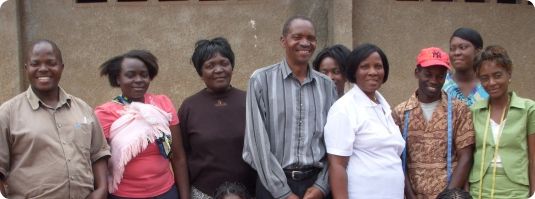Women’s Empowerment in Zambia Benefits Husbands, Too

Margaret* is HIV-negative. Her husband, Joseph*, is HIV-positive. They have four children together and have been married for 25 years.
Before becoming involved in the personal and small business development programs of the Zambia Anglican Council (ZAC), Margaret kept hidden the fact that she was married to someone with HIV. In addition to the health risks, the disease carries with it a stigma that touches not only the infected individual, but his or her spouse and family as well. Even in high-prevalence areas, the social impact of HIV can still have a strong negative effect on a person’s relationships and ability to earn an income.
One day, ZAC held an event in her village to educate the community about malaria and how it can be prevented and treated. Margaret received a long-lasting insecticide-treated net for her home, to protect her and her husband from the mosquito bites that cause malaria. Later, when the Malaria Control Agents – local health volunteers trained by NetsforLife® – visited her house to follow up, Margaret remembered that she had heard about ZAC’s adult literacy program, and asked to join. After a few months, she asked if her husband could come as well.
Grace Mazala Phiri is the National Program Director for ZAC. She visited New York at the end of February for the events related to the United Nations Commission on the Status of Women (UNCSW). Here, she explains how Margaret and Joseph came to be involved in the adult literacy program:
Through the adult literacy program, Margaret and Joseph learned crafts that could help them earn a good income. Margaret chose tailoring, and Joseph chose sausage making and shoemaking. In addition to developing personally and gaining livelihood skills, the couple also started feeling more integrated and active in their community. Building trust with their neighbors and the ZAC staff they had come to know, Margaret started to feel that it would be alright to come out in the open about their status as a serum discordant couple – that is, one partner being HIV-negative and the other HIV-positive. She asked the literacy program coordinator if there was someone she could talk to about something private, and in fact she ended up talking to Grace.
When Margaret opened up about her husband’s HIV status, Grace encouraged her to become part of a local Circles of Hope support group, and to bring her husband, too. At meetings, Margaret and Joseph had a chance to talk to other couples about their experiences, and receive advice from professional counselors on how to stay healthy and maintain a happy and fulfilling marriage.
Since revealing their HIV status to their community, Margaret and Joseph have continued their participation in both the adult literacy program and Circles of Hope. In addition to reading and writing, the adult literacy program also teaches “functional literacy” – educating people, particularly women, about how government and financial institutions run and what kinds of decisions they are personally empowered to make. Along with basic knowledge of banking systems, ZAC provides access to financial services like micro-finance loans. Participants in the adult literacy program are eligible for loans that can help them turn the skills they learned into small businesses that generate income.
Margaret and Joseph applied for a loan to purchase some chickens. Those chickens laid eggs and produced offspring, and the couple had enough to sell for income while also increasing their flock. Here, Grace relates how Margaret and Joseph have grown their small operation into a bustling livestock business, providing a great example of how business training and access to start-up funds can lead to success.
The month of March is a time to celebrate courageous women like Margaret, who worked persistently to overcome obstacles, develop skills and build up those around her. She took a risk in joining the adult literacy class, in talking about her husband’s HIV status, and in applying for a loan to start a small business – but now she and her husband are living as full and integral members of their community, and helping their whole village to prosper.
“Gender awareness and women’s empowerment is a theme that runs throughout ZAC’s work, and really throughout all our programs at Episcopal Relief & Development,” said Danielle Tirello Givens, Program Officer. “We work with women to increase their access to information and resources and build up their skills, and we work with whole communities, men included, to help people open up to new ways of relating and making decisions. Change can be slow, sometimes, but integrating gender awareness into the larger development activities has shown great results so far. ”
For more information on International Women’s Day, March 8, click here.
*Names have been changed


